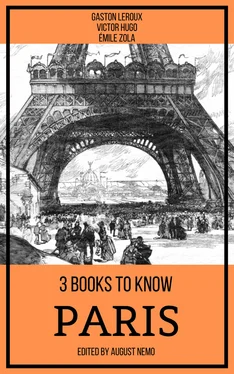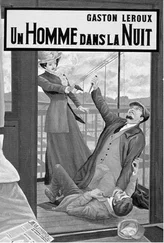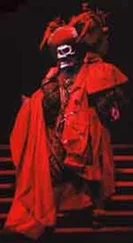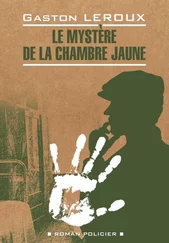“‘Tis in truth, a frightful tale,” said Oudarde, “and one which would make even a Burgundian weep.”
“I am no longer surprised,” added Gervaise, “that fear of the gypsies should spur you on so sharply.”
“And you did all the better,” resumed Oudarde, “to flee with your Eustache just now, since these also are gypsies from Poland.”
“No,” said Gervais, “‘tis said that they come from Spain and Catalonia.”
“Catalonia? ‘tis possible,” replied Oudarde. “Pologne, Catalogue, Valogne, I always confound those three provinces, One thing is certain, that they are gypsies.”
“Who certainly,” added Gervaise, “have teeth long enough to eat little children. I should not be surprised if la Sméralda ate a little of them also, though she pretends to be dainty. Her white goat knows tricks that are too malicious for there not to be some impiety underneath it all.”
Mahiette walked on in silence. She was absorbed in that revery which is, in some sort, the continuation of a mournful tale, and which ends only after having communicated the emotion, from vibration to vibration, even to the very last fibres of the heart. Nevertheless, Gervaise addressed her, “And did they ever learn what became of la Chantefleurie?” Mahiette made no reply. Gervaise repeated her question, and shook her arm, calling her by name. Mahiette appeared to awaken from her thoughts.
“What became of la Chantefleurie?” she said, repeating mechanically the words whose impression was still fresh in her ear; then, ma king an effort to recall her attention to the meaning of her words, “Ah!” she continued briskly, “no one ever found out.”
She added, after a pause,—
“Some said that she had been seen to quit Reims at nightfall by the Fléchembault gate; others, at daybreak, by the old Basée gate. A poor man found her gold cross hanging on the stone cross in the field where the fair is held. It was that ornament which had wrought her ruin, in ‘61. It was a gift from the handsome Vicomte de Cormontreuil, her first lover. Paquette had never been willing to part with it, wretched as she had been. She had clung to it as to life itself. So, when we saw that cross abandoned, we all thought that she was dead. Nevertheless, there were people of the Cabaret les Vantes, who said that they had seen her pass along the road to Paris, walking on the pebbles with her bare feet. But, in that case, she must have gone out through the Porte de Vesle, and all this does not agree. Or, to speak more truly, I believe that she actually did depart by the Porte de Vesle, but departed from this world.”
“I do not understand you,” said Gervaise.
“La Vesle,” replied Mahiette, with a melancholy smile, “is the river.”
“Poor Chantefleurie!” said Oudarde, with a shiver,—“drowned!”
“Drowned!” resumed Mahiette, “who could have told good Father Guybertant, when he passed under the bridge of Tingueux with the current, singing in his barge, that one day his dear little Paquette would also pass beneath that bridge, but without song or boat.
“And the little shoe?” asked Gervaise.
“Disappeared with the mother,” replied Mahiette.
“Poor little shoe!” said Oudarde.
Oudarde, a big and tender woman, would have been well pleased to sigh in company with Mahiette. But Gervaise, more curious, had not finished her questions.
“And the monster?” she said suddenly, to Mahiette.
“What monster?” inquired the latter.
“The little gypsy monster left by the sorceresses in Chantefleurie’s chamber, in exchange for her daughter. What did you do with it? I hope you drowned it also.”
“No.” replied Mahiette.
“What? You burned it then? In sooth, that is more just. A witch child!”
“Neither the one nor the other, Gervaise. Monseigneur the archbishop interested himself in the child of Egypt, exorcised it, blessed it, removed the devil carefully from its body, and sent it to Paris, to be exposed on the wooden bed at Notre-Dame, as a foundling.”
“Those bishops!” grumbled Gervaise, “because they are learned, they do nothing like anybody else. I just put it to you, Oudarde, the idea of placing the devil among the foundlings! For that little monster was assuredly the devil. Well, Mahiette, what did they do with it in Paris? I am quite sure that no charitable person wanted it.”
“I do not know,” replied the Rémoise, “‘twas just at that time that my husband bought the office of notary, at Bern, two leagues from the town, and we were no longer occupied with that story; besides, in front of Bern, stand the two hills of Cernay, which hide the towers of the cathedral in Reims from view.”
While chatting thus, the three worthy bourgeoises had arrived at the Place de Grève. In their absorption, they had passed the public breviary of the Tour-Roland without stopping, and took their way mechanically towards the pillory around which the throng was growing more dense with every moment. It is probable that the spectacle which at that moment attracted all looks in that direction, would have made them forget completely the Rat-Hole, and the halt which they intended to make there, if big Eustache, six years of age, whom Mahiette was dragging along by the hand, had not abruptly recalled the object to them: “Mother,” said he, as though some instinct warned him that the Rat-Hole was behind him, “can I eat the cake now?”
If Eustache had been more adroit, that is to say, less greedy, he would have continued to wait, and would only have hazarded that simple question, “Mother, can I eat the cake, now?” on their return to the University, to Master Andry Musnier’s, Rue Madame la Valence, when he had the two arms of the Seine and the five bridges of the city between the Rat-Hole and the cake.
This question, highly imprudent at the moment when Eustache put it, aroused Mahiette’s attention.
“By the way,” she exclaimed, “we are forgetting the recluse! Show me the Rat-Hole, that I may carry her her cake.”
“Immediately,” said Oudarde, “‘tis a charity.”
But this did not suit Eustache.
“Stop! my cake!” said he, rubbing both ears alternatively with his shoulders, which, in such cases, is the supreme sign of discontent.
The three women retraced their steps, and, on arriving in the vicinity of the Tour-Roland, Oudarde said to the other two,—
“We must not all three gaze into the hole at once, for fear of alarming the recluse. Do you two pretend to read the Dominus in the breviary, while I thrust my nose into the aperture; the recluse knows me a little. I will give you warning when you can approach.”
She proceeded alone to the window. At the moment when she looked in, a profound pity was depicted on all her features, and her frank, gay visage altered its expression and color as abruptly as though it had passed from a ray of sunlight to a ray of moonlight; her eye became humid; her mouth contracted, like that of a person on the point of weeping. A moment later, she laid her finger on her lips, and made a sign to Mahiette to draw near and look.
Mahiette, much touched, stepped up in silence, on tiptoe, as though approaching the bedside of a dying person.
It was, in fact, a melancholy spectacle which presented itself to the eyes of the two women, as they gazed through the grating of the Rat-Hole, neither stirring nor breathing.
The cell was small, broader than it was long, with an arched ceiling, and viewed from within, it bore a considerable resemblance to the interior of a huge bishop’s mitre. On the bare flagstones which formed the floor, in one corner, a woman was sitting, or rather, crouching. Her chin rested on her knees, which her crossed arms pressed forcibly to her breast. Thus doubled up, clad in a brown sack, which enveloped her entirely in large folds, her long, gray hair pulled over in front, falling over her face and along her legs nearly to her feet, she presented, at the first glance, only a strange form outlined against the dark background of the cell, a sort of dusky triangle, which the ray of daylight falling through the opening, cut roughly into two shades, the one sombre, the other illuminated. It was one of those spectres, half light, half shadow, such as one beholds in dreams and in the extraordinary work of Goya, pale, motionless, sinister, crouching over a tomb, or leaning against the grating of a prison cell.
Читать дальше









